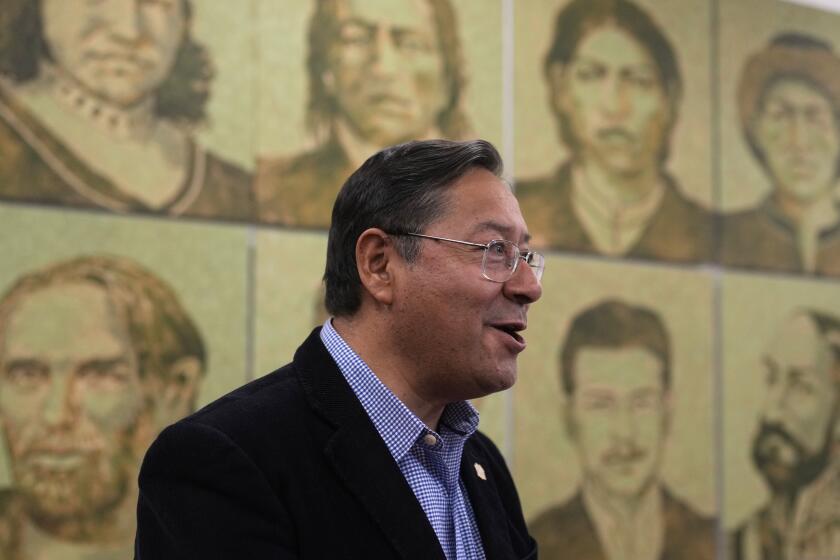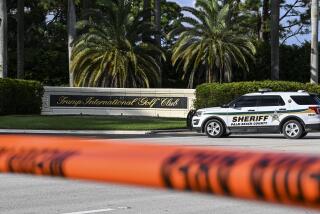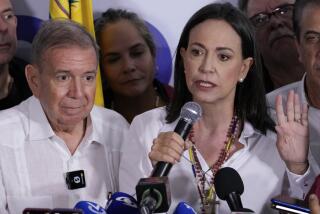Bolivia’s former president Evo Morales claims his car was shot at in attempted assassination

- Share via
LA PAZ, Bolivia — Former President Evo Morales of Bolivia claimed he survived an assassination attempt on Sunday after unidentified men opened fire on his car. He was not injured in the alleged attack that quickly became the latest flashpoint in a power struggle between the ex-leader and his successor, current President Luis Arce.
Morales, 65, blamed President Arce’s government for the outburst of violence, saying it was part of a coordinated campaign by the Bolivian authorities to sideline him from politics.
Arce’s government pointed its finger at Morales, claiming the leftist icon staged an attack on himself to boost his own political fortunes ahead of presidential elections next year.
Both sides rejected the claims against them.
The flurry of pointed accusations threatened to ignite Bolivia’s political tinderbox and plunge the cash-strapped Andean nation of 12 million further into turmoil.
Morales alleged the shots were fired while he was being driven in Bolivia’s coca leaf-growing region of Chapare, the ex-president’s rural stronghold whose residents have blockaded the main east-west highway for the past two weeks in a show of defiance and solidarity after new legal threats against Morales emerged.
Former Bolivian President Evo Morales is accusing political ally-turned-rival President Luis Arce of deceiving the Bolivian people by staging a coup.
The roadblocks and mass vigils have choked off major cities and disrupted food and fuel supplies, exacerbating the country’s rolling economic crisis.
Morales, who served as Bolivia’s first Indigenous president from 2006-2019, described the burst of gunfire that hit his car on Sunday as part of a conspiracy by Arce’s government to drive him out of politics.
On Sunday, Morales emerged unscathed, appearing on his weekly radio show in his usual calm manner to recount what happened. He told the radio host that as he was leaving home for the radio station, hooded men fired at least 14 shots at his car, wounding his driver.
“Arce is going to go down as the worst president in history,” Morales said. “Shooting a former president is the last straw.”
From Arce’s government, Deputy Security Minister Roberto Rios insisted that police had not carried out any kind of operation against the former president.
He said authorities were investigating a theory that Morales had conducted “a possible self-attack.”
Former President Evo Morales has returned to Bolivia after an election that returned his socialist party to power a year after he fled the nation amid a wave of protests.
“Morales is seeking confrontation and violence on the roads for political interests and to achieve impunity,” Rios told reporters.
Officials in Arce’s government did not respond to requests from the Associated Press to elaborate on the contested claims.
As cellphone footage spread online showing Morales’ driver bleeding from the back of his head, his supporters called for mass rallies to show their anger. In the video taken from inside the car, Morales can be seen in the passenger’s seat holding a phone to his ear as the vehicle swerves and a woman’s voice shrieks “Duck!”
The footage shows the car’s front windshield cracked by at least three bullets and its rear windshield shattered. Morales can be heard saying, “Papacho has been shot in the head,” apparently referring to his driver.
“They are shooting at us,” Morales continues on the phone. “They shot the tire of the car and it stopped on the road.”
Even before the shots were fired, the country’s political atmosphere was rife with personal attacks and at times violence.
With a carefully orchestrated public profile, the president of El Salvador claims sky-high popularity after jailing gangs. The reality is more complicated.
In June there was an attempted coup by a rogue general who later accused Arce of asking him to stage the uprising to boost the president’s own flagging popularity.
Last month, in a show of political strength, Morales and his supporters set off on a highly anticipated days-long march to La Paz, the capital, from a rural village in an effort to pressure Arce to address dire shortages of fuel and dollars.
Imported goods are scarce and prices are rising. Drivers wait for hours to fill up at gas stations. The gap between the official and black-market exchange rates is widening.
The march in September, which also called for authorities to allow Morales to run in next year’s election despite his disqualification by the election commission, quickly devolved into street clashes with counter-protesters.
Earlier this month, Bolivian prosecutors launched an investigation into accusations that Morales fathered a child with a 15-year-old girl in 2016, classifying the case as statutory rape. Dismissing the renewed prosecution attempt as politically motivated, Morales has refused to testify in court.
Since reports circulated of a possible warrant against him, the ex-president has been holed up in the Chapare region, in central Bolivia, where loyalist coca growers have kept vigilant watch to protect him from arrest.
Valdez and Debre write for the Associated Press. DeBre reported from Buenos Aires.
More to Read
Sign up for Essential California
The most important California stories and recommendations in your inbox every morning.
You may occasionally receive promotional content from the Los Angeles Times.













